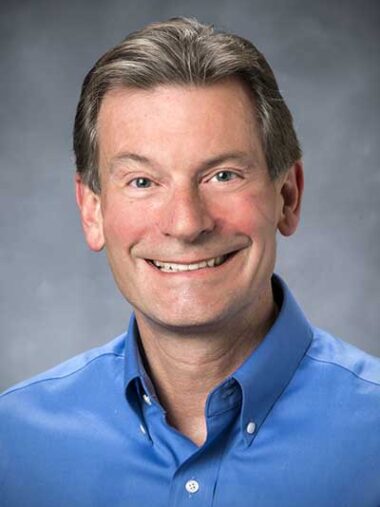
Meet Greg Waters
- Khoury Alumni
- MS in Computer Science ’89
- Co-op employer
Up until eight years ago, Khoury College 40 for 40 honoree Greg Waters wouldn’t have described himself as an involved alumnus. He’d barely had time to be involved back when he was a student; when Waters graduated in 1989 with a master’s degree in computer science, he was juggling a recent promotion, a new house, and a new baby.
“Northeastern and I were reintroduced when I was running a public semiconductor and sensor company in San Jose called Integrated Device Technologies (IDTI). We were hiring a lot of computer science and engineering people, and we also had this beautiful campus in Silicon Valley that had excess space” Waters said. “One of the previous CEOs was also a Northeastern grad and when we met for breakfast, he mentioned that Northeastern had ambitions to establish a technical graduate campus in the Bay Area. This sparked a series of conversations that led to Northeastern co-locating with our headquarters building to house their new Bay Area campus in 2015.”
The graduate school and business colocation took a couple of years to build momentum but became a huge success. Having so many students just across the hall brought new liveliness and energy to the IDTI work environment and jobs for some of the students.
A second project began in 2018, when Northeastern requested Waters evaluate the startup incubation potential of several research programs. Professor Jose Martinez Lorenzo’s laboratory had performed groundbreaking work in distributed artificial intelligence for drone swarms, which is a very difficult problem to solve. This early research was impressive but far from customer-ready, so Waters founded MatrixSpace, a Delaware corporation that began operations in January 2020.
MatrixSpace’s mission is to provide sensing products that digitize the outdoors, coupled with the AI processing to tell people what’s out there. The company’s cutting-edge sensors include a radar unit the size of your smartphone that weighs under a pound and can sense at long distances; these small sensors can be placed on the ground, vehicles, or aircraft, and when coupled with optical sensing and AI, create the ultimate safety and security system. They can detect hazards, enable light aircraft to fly more safely, and to provide secure perimeters anywhere in the world. MatrixSpace has also hired many Khoury College co-ops, and it operates out of the Kostas Research Institute at Northeastern University campus in Burlington, Massachusetts which means Waters has a familiar neighbor.
“It’s funny — I was their landlord for a while, and now they’re mine,” Waters laughed. “What a thought.”
To me, the scholarships are about getting everybody into the tech game. Anybody can learn tech if they’re so motivated. Our job as a society is to make tech skills accessible to everyone. We should be teaching them in high school
Greg Waters, MSCS ’89
Waters finds himself drawn back to Khoury College again and again by the college’s twin commitments to diversity and innovation. He applauds Khoury’s efforts to close the gap with programs like Align, a direct pathway to a master’s degree in computer science for students from all undergraduate backgrounds. Waters has a soft spot for the Align program; his own undergrad degree was in engineering and had there been an Align program in the ‘80s, he believes he would have applied. To ensure that advantage is open to all, Waters funds three scholarships: the Greg and Carolyn Waters Align Scholarship, the Torch Scholars, and the KCCS Dean’s Fund.
“To me, the scholarships are about getting everybody into the tech game,” Waters said. “Anybody can learn tech if they’re so motivated. Our job as a society is to make tech skills accessible to everyone. We should be teaching them in high school.”
As Khoury College celebrates its 40th year, Waters is excited to finally describe himself as an involved alumnus, and excited to see where the school goes next.
“I think my favorite thing about Northeastern is that they keep really working on getting better, and how to be a leader in adapting higher education to the needs of the modern world,” Waters said. “That attitude — in simple words, go to where the bright students are, versus them necessarily coming to us — is different from what I see out there in other institutions. It’s an exciting time with more to come.”